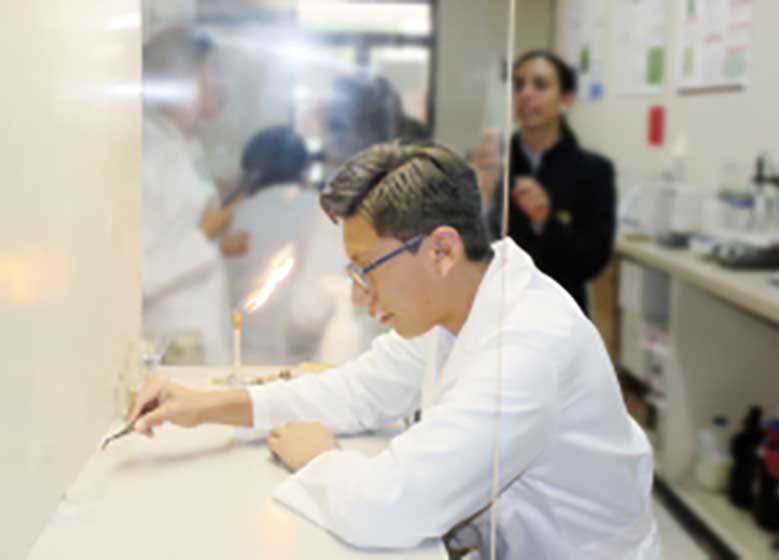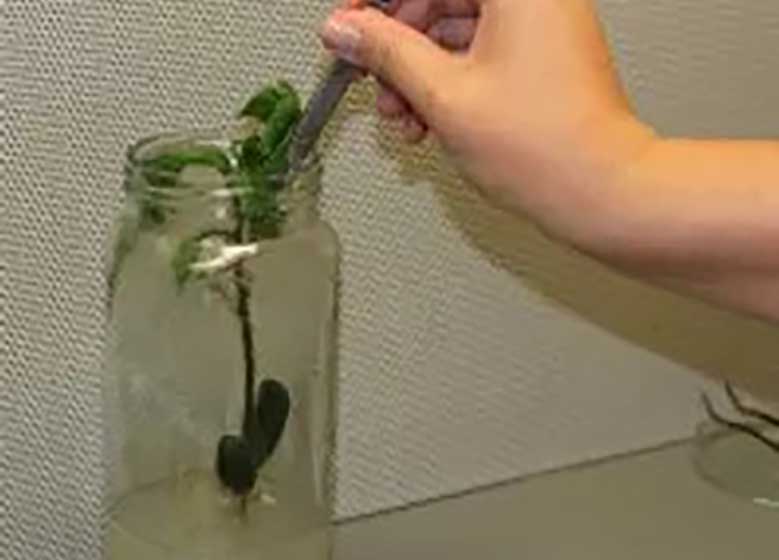Laboratories
Plant Biotechnology Laboratory
Office: Darwin, DW-107, USFQ
Phone: (+593 2) 297-1700 ext. 1442
E-mail: bioteclab@usfq.edu.ec

Approach
The Plant Biotechnology Laboratory is in charge of various research projects using molecular biology tools and in vitro plant cultivation. The main focus of the Laboratory is plants; therefore, interested researchers and students have the opportunity to develop projects and initiatives in this field. In addition, the Laboratory collaborates with researchers from other areas to carry out interdisciplinary studies, mainly related to the genetic diversity of animals.
Projects
Plant Genetic Diversity
- “Preliminary determination of the genetic diversity of guayabillo (Psidium galapageium) and guava (Psidium guajava) in the Isabela, Santa Cruz, and San Cristóbal Islands in Galapagos and the comparison of the diversity of guava with samples collected from various provinces of continental Ecuador."
- “Study of the genetic diversity of quinoa (Chenopodium quinoa) in 8 provinces of the Ecuadorian Andes”: Analysis of 84 individuals of quinoa from 7 provinces of the Ecuadorian Andes. Identification of 3 possible lineages of the crop in Ecuador.
- “Standardization of specific SSR primers for Ilex guayusa": Design and standardization of microsatellite molecular markers for the study of the genetic diversity and population structure of guayusa in the Ecuadorian Amazon.
- “Standardization of specific primers for the amplification of SSR regions where mortiño (Vaccinium floribundum Kunth) is grown": Standardization of polymorphic specific microsatellites using mortiño samples from three Ecuadorian provinces.
- “Study of genetic diversity of mortiño (Vaccinium floribundum Kunth) in the Ecuadorian Andes": Analysis of the genetic diversity of the mortiño in paramos of ten provinces of the Ecuadorian Andes, with the use of polymorphic microsatellite markers (SSRS), to determine genetic variability, structure, and status of the population.
Gene expression
- “Relative quantification of the expression of candidate genes for tolerance to salinity in the tomato tree (Solanum betaceum) by means of the RT-qPCR technique": To evaluate the genetic expression of two contrasting tomato genotypes in their ability to tolerate high concentrations of salt.
In vitro culture
- “In vitro regeneration of naranjilla (Solanum quitoense) from explants of hypocotyls, petioles, and apical buds": Regeneration of shoots in MS medium from apical buds with different concentrations of ANA, and hypocotyls and petioles with different concentrations of ANA, GA3, and BAP.
- “In vitro micro propagation of Ilex guayusa through nodal segments": Establish an efficient protocol for the in vitro propagation of guayusa through nodal segments.
- In vitro micropropagation of caimito (Pouteria caimito: star apple)". Standardization of in vitro culture protocols for micropropagation of Caimito (Pouteria sapota) in the Ecuadorian Amazon with the objective of making this tree known as well as conserving it.
Self-incompatibility
- Preliminary phenotypic study of capulí gametophytic auto-incompatibility (Prunus serotina subsp. Capuli). Genotyping of 23 individuals by means of Intron I amplification and the CAPS system. With controlled crosses and observation of pollen tubes, the operation of this system will be determined.
- Molecular characterization of the S-RNase gene in capulí (Prunus serotina subsp. Capuli)”: Identification of alleles of the S-RNase gene from capulí by developing a system of molecular markers CAPS.
Animal Genetic Diversity
- “Genetic diversity of the Spectacled Bear (Tremarctos ornatus) in the Metropolitan District of Quito through the analysis of mitochondrial DNA": Characterization of the genetic diversity of the Andean bear population of the Metropolitan District of Quito using a mitochondrial marker.
- “Genetic diversity of yellow fin tuna (Thunnus albacares) between Ecuador and Mexico using microsatellite loci": Determine with microsatellite molecular markers if the tunas caught in Ecuador and continental Mexico belong to one or different populations.
- “Genetic diversity and population structure of Manta birostris on Isla de la Plata, Ecuador": Genotyping based on SSR of manta individuals observed in the years 2010-2013 allows us to glimpse on migratory behavior and dispersal biased by sex in populations of giant manta rays.
Publications
| Year | Title | Authors | Document | ||
|---|---|---|---|---|---|
| 2016 | Saponin determination, expression analysis and functional characterization of saponin biosynthetic genes in Chenopodium quinoa leaves | Jennifer Fiallos-Jurado, Jacob Pollier, Tessa Moses, Philipp Arendt, Noelia Barriga-Medina, Eduardo Morillo, Venancio Arahana, Maria de Lourdes Torres, Alain Goossens | Download | ||
| 2016 | Preliminary analysis of the genetic diversity and population structure of mortiño (Vaccinium floribundum Kunth). | María Mercedes Cobo, Bernardo Gutiérrez, Andrés F. Torres, María de Lourdes Torres | Download | ||
| 2015 | Genetic diversity and distribution patterns of Ecuadorian capuli (Prunus serotina) | Juan J. Guadalupe, Bernardo Gutiérrez, Dámaris P. Intriago-Baldeón, Venancio Arahana, José Tobar, Andrés F. Torres, María de Lourdes Torres | Download | ||
| 2015 | Estandarización de un protocolo de regeneración de cebolla chalote (Allium cepa var. aggregatum) a partir de meristemas apicales | Joely Vega, Venancio S. Arahana B., María de Lourdes Torres | Download | ||
| 2015 | Identificación de alelos S asociados con autoincompatibilidad en individuos de capulí (Prunus serótina subsp. capulí) mediante la amplificación del Intrón I del gen de la S-RNasa | Milton Gordillo, José Tobar, Venancio S. Arahana B., María de Lourdes Torres | Download | ||
| 2013 | Employing molecular markers to identify Monilinia fructicola in Ecuadorian peach orchards | Cristina Salgado, Venancio Arahana, José Tobar, Bernardo Gutiérrez, María de Lourdes Torres | Download |
Team Work
- Ma. de Lourdes Torres: Laboratory Director
- Andrés Torres: Associate Investigator
- Bernardo Gutiérrez: Associate Investigator
- Gabriela Pozo: Associate Investigator
- Ma. José Pozo: Associate Investigator
- Ma. Mercedes Cobo: Associate Investigator
OUR MISSION
To develop quality research projects with species of importance for agriculture, environment, conservation and economy of the country.
.



